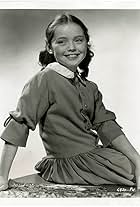Janina Faye
☼ Born on 16 December 1948, in Hammersmith, London, England, UK
Biography
Janina Faye is a former child actress, quite popular during the 1950s and 1960s. She was born in England to a Polish expatriate father. She appeared in several classic fantasy and horror films, having a substantial role in "Dracula" (1958).
In 1948, Faye was born in Hammersmith, a district of West London. For decades, Hammersmith had a substantial population of Polish expatriates. Faye was born under the name "Janina Faye Smigielski" to Jan Smigielski and his wife Florence Louisa Jonathan. Her father was one of several Polish expatriate pilots recruited by the Royal Air Force (RAF) during World War II. During the Battle of Britain (1940), Smigielski served as part of the "No. 303 Squadron RAF". It was one of the 16 Polish squadrons serving in the RAF during the war.
Faye had started her acting by 1956, with bit parts in various films. Her first credited role was in the drama film "The Story of Esther Costello" (1957), where she played a child version of the eponymous Esther Costello. The film was based on a 1952 novel by Nicholas Monsarrat (1910 -1979), intended as an expose of large-scale fund-raising. Costello was loosely based on deaf-blind activist Helen Keller (1880 - 1968), and the character was also deaf-blind. In the film, Costello is taken under the wing of a wealthy female patroness. She is then used by the patroness' husband to financially exploit would-be-philanthropists through self-serving fund-raising campaigns. The man eventually rapes the teenage girl. The f
(click to expand)
ilm was the 11th most popular film at the British box office in 1957.
In 1958, Faye had her first substantial role in the horror film "Dracula". She played the original character Tania, daughter of the Holmwood family's housekeeper and treated as a surrogate niece by Lucy Holmwood (played by Carol Marsh). When "Aunt Lucy" turns into a vampire, she starts preying on young Tania. The character of Lucy was based on Lucy Westenra from the original novel, a fledgling vampire who only preyed on children. The film was a box office hit and inspired several sequels, thought Faye did not appear in any of them.
In 1959, Faye had a minor role in the horror comedy "The Headless Ghost". The film's plot features three college students who decide to spend the night in a haunted castle. Most of the ghosts there are harmless, but a headless ghost decides to hold the trio as prisoners. He wants them to locate his head, which has been missing since his execution. The film was produced by the film studio Anglo-Amalgamated, and was primarily intended as an export for the American market.
In 1960, Faye had a leading role in the film "Never Take Sweets from a Stranger", which covered the previously taboo matter of child sexual abuse. Faye played Jean Carter, a young girl who accuses an adult man that he offered her a reward to see her naked. The man is wealthy, respected, and well-connected, while the Carter family are newcomers in town. Local society refuses to believe Carter and is hostile towards her. Until the old man targets Carter again and kills Carter's only friend, with his actions removing his cover of respectability. The film was intended as a "social message" film about the exploitation of children, but was a box office flop as audiences and critics founds the subject matter distasteful. The film was rediscovered in the 1990s, gaining critical acclaim for its realistic portrayal of its subject matter.
In 1961, Faye portrayed a young version of Hellen Keller in theatrical productions of the play "The Miracle Worker" (1959) by William Gibson (1914-2008). The play depicted the childhood of Hellen Keller and the lessons of her teacher, Anne Sullivan (1866 - 1936). The play was based on "The Story of My Life" (1903), Keller's autobiography.
In 1962, Faye had a supporting role in the crime thriller film "Don't Talk to Strange Men", portraying a sister of the protagonist Jean (played by Christina Gregg). In the film, Jean has a telephone conversation with a stranger and is infatuated with the man. Only to realize that the stranger is a serial killer who is targeting both Jean and Jean's sister as potential victims. The film was not particularly successful, though modern critics have found that its warnings against trusting strangers are still relevant for adolescents.
Also in 1962, Faye has a major role in the science fiction horror film "The Day of the Triffids", based on a 1951 novel by John Wyndham (1903-1969). The film depicts an invasion of the Earth by extraterrestrial, carnivorous plants. As most people on Earth are blinded by the effects of a meteor shower, orphaned schoolgirl Susan (played by Faye) maintains her eyesight. She finds herself surrounded by panicked blind people who try to grab her. The film was relatively popular, though its detractors have complained about major deviations from the source novel and about a rather weak conclusion to its main plot.
In 1964, Faye had a supporting role in the film "The Beauty Jungle", which dealt with beauty contests and their seedy behind-the-scenes workings. Faye played Elaine Freeman, younger sister of the protagonist Shirley Freeman (played by Janette Scott). In the film, Shirley is a typist who has won a beauty contest despite having no previous experience or preparation. She decides to enter beauty contests full-time. She wins substantial amounts of money, but has to deal with contest judges blackmailing her into sleeping with. She is eventually disillusioned with the beauty contest circuit, and is disturbed when she realizes that Elaine is following in her footsteps.
By the mid-1960s, Faye was regularly appearing in television and her film career was on hiatus. In 1969, Faye had a relatively minor role in the exploitation film "The Smashing Bird I Used to Know" (1969). The film's main character was Nicki Johnson (played by Madeleine Hinde), an emotionally troubled teenage girl. Nicki is sexually harassed by her mother's boyfriend, and stabs him to death.
Also in 1969, Faye had a supporting in the film "Dance of Death", an adaptation of a 1900 play by August Strindberg (1849-1912). The play and film focus on the relationship between Edgar and Alice, an aging couple which is about to experience their 25th wedding anniversary. They have grown to hate each other, they have alienated their children, and they live an isolated life. So their anniversary "celebration" consists of vicious attempts to destroy each other. Faye plays their daughter Judith, who aspires to marry her cousin and has vampire-like tendencies.
During the 1970s, Faye mostly appeared in television roles. She appeared in the historical series "Napoleon and Love" (1974), which depicted the relationship between the emperor Napoleon I and his various wives and lovers. Her only film appearance in this decade was the biographical film "John Keats: His Life and Death" (1973), covering the life of the Romantic poet John Keats (1795-1821). Keats died at the age of 25 due to tuberculosis, but his work found enduring popularity following his death. Faye portrayed Fanny Brawne (1800-1865), Keats' fiancee and the muse for many of his works.
Faye made infrequent television appearances during the 1980s and 1990s. She made a comeback to film when she appeared in the the horror short film "Green Fingers" (2000), concerning a mysterious woman and her strange garden. The film was reminiscent of horror anthology stories, though it was not intended as part of a larger work.
By 2021, Faye was 73-years-old. She has seemingly retired from acting, though she has at times appeared in film festivals. Following an appearance in the Festival of Fantastic Films in Manchester, she has often come in contact with fans of her old films. As one of the few surviving cast members of "Dracula" (1958), Faye has at times been interviewed and asked to offer additional information about her co-stars. She has had a following among fans of classic horror films.
In the role of actor
Unclaimed (21/09/2013)
At the end of the Vietnam war, it was claimed that no American soldiers were left behind enemy lines. Director Michael Jorgensen’s documentary Unclaimed somewhat challenges this statement with this story about a man, who is located living in Vietnam and claims to be a long missing American soldier. The film’s main focus, and narrator, […]


